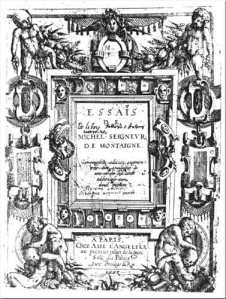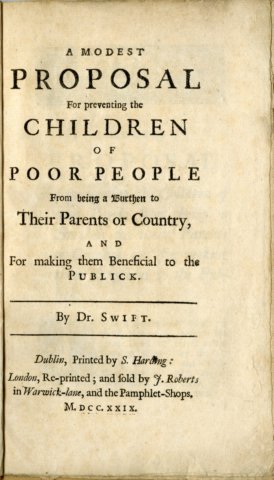
Publisher: W. W. Norton & Company
Author: Michel De Montaigne
I was encouraged some years back to read a piece by Michel De Montaigne called “Of Cannibals.” I was under the impression that is was something like “A Modest Proposal,” which is possibly my favorite piece of satire. While I would not call this satire, the way that Montaigne displays truth through contrast is similar. By comparing the people of Brazil during the 16th century with the Europeans of that same time, Montaigne demonstrates that our vices and supposed virtues are not all that different; our humanity with its shortcomings equal. Despite the fact that Europe considered itself a noble race, instead of the descendants of a barbarous people, such as the Hungarians, Gauls, Scythian, and Celts that preceded them – besides even the Greeks and Romans – the people of Europe, as all people do, carried on a nature and performances that were, by all accounts, barbarous. Though this essay was written to people of a certain time and place, its message still applies today.
Indeed, just as we do today, Europe had deemed itself developed, virtuous, full of valor, and enlightened. They were superior in body and mind to the barbarous nations they encountered. But as Montaigne writes, they judged these things not “by reason’s way” but by what was popular, socially accepted, the norm. Instead of highlighting faults via truth, they compared what was akin to themselves as good; what was not similar, the opposite, was deemed bad. The author quotes an encounter out of Greek history:
“I do not know what barbarians these are, but the formation of this army that I see is not at all barbarous.”
This is not a description of some group we might call barbarous, such as the Celts, Thracians, or Gauls, but of the Romans. Everyone who was different was a barbarian to the Greeks. This idea runs through the essay by comparing the regular practices of cannibals with those of Europe. His point is that while they seem foreign, we are much akin.
What are the virtues of this South American people? In truth, the virtues are similar to those of Europeans. They marry and have children. There are leaders, prophets, preachers. They hunt and have war. In fact, Montaigne notes, their way of waging war is not dissimilar to Europe’s wars even if their motives are. They are not wasteful nor too greedy. They call each other brother, and father, and child. While their food may be different in some ways, people of Europe and the Americas can enjoy it just as well.
Most of all, they are human. They make songs and poems, much like the Greeks, Montaigne notes, and their beds are like those found on Europe’s ships. They have swords, and grills; they shave, and eat and drink fish and wine. These people are told two things: have valor and love their wives. They not only have religion but a soul – an immortal one at that.
While these people still need Christ, we should be ashamed, Montaigne notes, as we basely look upon them. While not all cultures are equally noble, not all “noble” ones are good. Each has its faults to various degrees, and each needs to look at itself and see its faults along with its successes. This, however, we refrain from doing. “From this vice spring many great abuses,” he states.
How many of the above virtues seem to differ from those said to be upheld by the people of the 15th to 17th centuries in Europe? How different are they from those we claim to hold now? It should be noted that during the time of Montaigne, the war between the Catholic’s and Huguenots had broken out. In other places, it was the Catholics and the Lutherans; still others, the Anglicans, and Waldensians, and Tyndales, and Wycliffes, and Calvins, and so on. Not all were organized sects of Christianity, but all were workers of the Word. They sought the reform the Church needed, not to become like the world, but to better hold to the teachings of Christ. Yet what were these Christians doing? Were they having councils to work things out as in the early Church? Were they working to find agreement or examining their own faults? Were they trying to find the unity in Christ that He so desires?
No, they were eating themselves alive.
But there never was any opinion so disordered as to excuse treachery, disloyalty, tyranny, and cruelty, which are our ordinary vices.
Montaigne was not only talking to the religious community and its leaders; he was talking to the whole of Europe. But there is no doubt who bears the greatest moral responsibility. The people of that time snubbed their noses at such “debase” cultures that existed in the Americas. The leaders of Europe, religious, political, and otherwise, treated their brothers, their “halves,” as through they were of another race. It was as though they denied the teachings and the Word they claimed to uphold.
Not that these barbarians and cannibals should not be looked at with horror – cannibalism is horrible and evil; it strikes me as fitting that it should have the word ‘bal’ in it – those same people failed to recognize that same barbarism within themselves.
Though the cannibals denied the humanity of their brothers by eating them, they still recognized it within themselves in relation to the others. Yet with all the advancement that the world had made, however much it had been enlightened, however much freedom the Gospel brought, the world and its leaders failed to stand upon their own foundation and thus denied the humanity of their brothers, fathers, and children, “among neighbors and fellow citizens and what is worse, on the pretext of piety and religion.” They persecuted not their enemies, but their brothers.
So we may well call these people barbarians, in respect to the rules of reason, but not in respect to ourselves, who surpass them in every kind of barbarity.
…
Truly here are real savages by our standards; for either they must be thoroughly so, or we must be; there is an amazing distance between their character and ours.
Towards the beginning of his essay, Montaigne present this illustration:
When I consider the inroads that my river, the Dordogne, is making in my lifetime into the right back in its descent, and that in twenty years it has gained so much ground and stolen away from the foundations of several buildings, I clearly see this is an extraordinary disturbance…
He notes also that rivers are subject to change, going one direction this day and another yesterday or tomorrow. Yet this illustration is more than rivers as the cannibals are more than those who eat people; each are representational. Europe had a stream of new ideas running through it, some going one way and others the opposite. While Christianity had brought great prosperity, some of those who taught it did so without the truth in their hearts and with wrong motives, thus corrupting the foundation of the world around them.
In the same way, the new ideas and ways of thinking, the new way people looked at the world around them had changed, and not entirely for the good. Where certain leaders had eroded the good foundation of Christ that had existed for many years before, the “new thinkers” eroded the foundation near to completion, one that is seemingly gone today. While many enlightened people thought themselves as having gained much ground, they had in the process destroyed the foundation on which they and their gains rested. They had, in essence, thrown off their newfound freedom to return to the treacherous and barbarous ways of their origins.
I am not sorry that we notice the barbarous horror of such acts, but I am heartily sorry that, judging their faults rightly, we should be so blind to our own. I think there is more barbarity in eating a man alive than in eating him dead.
Between religion, social, and political persecution, the world was a hotbed of hatred. Some might say that it is still today. Those claiming Christianity were heretics and hypocrites; the social classes were divided further by new, debase teachings of science, and the political wars intermingled and corrupted the two. Because of this strife, the people of Europe were literally eating themselves alive from the inside out. How ignoble to think this any different from the cannibals! Instead of capturing and killing our enemies, we do this to our brothers.
Both then and now, no matter the continent, we have been unable to look ourselves into the mirror of law and see our own faults, be they social, political, or religious. We have let ourselves become subjected to the “human disease” that infects all: the sinful nature. We pride ourselves in being clever and “advanced,” a loaded term of evolutionary origins and connotations, yet we “cannot help altering history a little” to excuse our current faults. We have not found our valor, honor, and worth in heart, will, and creed, but instead in strength and “survival of the fittest.” We are not “a character fit to bear true witness” of ourselves.
So what is the solution? If you were to ask Montaigne, he would probably say that we should look to the cultures of others who resemble the original nature of people. I am not so sure that this is the case. While it is good to learn from other cultures and take the good and learn from the bad, it is not good to model after them entirely. Likewise, the sinful nature is always present; without Christ, we are truly barbarous and enslaved.
Thus, we should be on the side of truth, regardless of whom it benefits in a passing moment. We should examine ourselves to see the faults within and compare ourselves to the truth, destroying and drowning our old Adam (Psa. 26:2, Lam. 3:40, 2 Cor. 13:5). Let us not become mired in tribalism and “us vs. them.” Learn. Do not decided what is good or bad by man’s fleeting and faulty wisdom but by God’s. Jet us judge things by “reason’s way,” by God’s way. It is His will that is unchanging, and His Word that is true and right. His design for us is the nature we should attend to. In this way, we can acknowledge our faults without fear and can lay down our shame, because we know a God that forgives. But let us do so now and share such truth and unity with others and end our incessant gorging of the flesh.
Blessings to you and yours,
~Rose
De Montaigne, Michel. “Of Cannibals.” vol. 1 The Norton Anthology of World Literature, W. W. Norton & Company. , 2nd ed., New York, W. W. Norton & Company, 2009, pp. 1631-40.






 Author: Jonathan Swift
Author: Jonathan Swift
